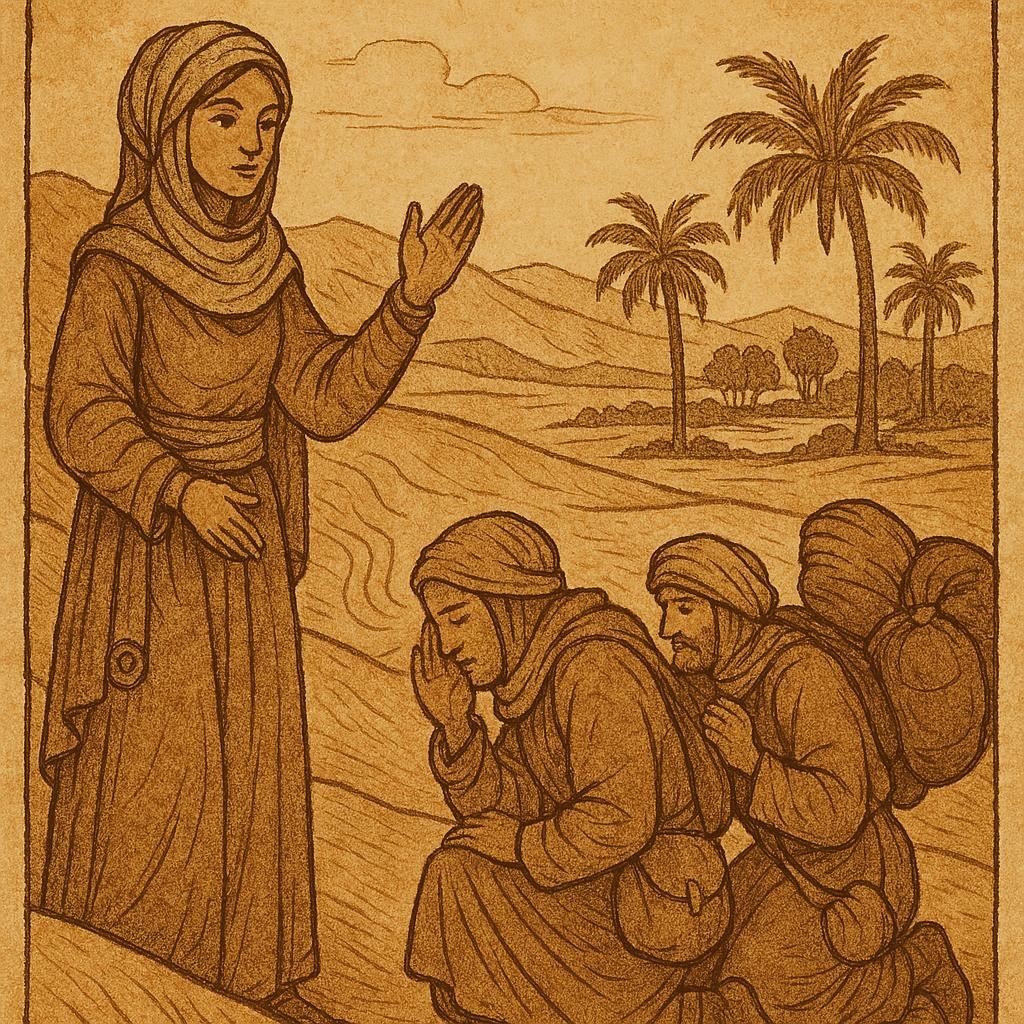In the heart of Mauritania, the desert stretches farther than the eye can see. Waves of golden dunes rise and fall like an endless ocean, their peaks glowing under the sun by day and shining silver under the moon by night. The desert is breathtaking, yet it is also dangerous. Those who walk its paths without wisdom risk losing themselves forever. Travelers often spoke of the whispering dunes, a mystery hidden in the sands, a voice that guided those who dared to listen.
One season, when the heat pressed down and the caravans moved slowly across the burning earth, a group of young travelers set out to cross the desert. They carried water in leather skins, dates wrapped in cloth, and courage in their hearts. They believed that strength and bravery would be enough to see them through. Yet the desert is not a place to be conquered with pride. Its secrets reveal themselves only to the patient.
The first days passed with little trouble. They marched together, counting the dunes and watching the stars at night. But on the third day, a strong wind began to rise. It rushed across the sands, swirling the air into ghostly shapes and filling their ears with strange sounds. At first the travelers thought it was only the wind. But as they listened closely, they began to hear something more. The dunes were whispering.
READ THIS:The Trickster Scorpion and the Desert Spirits
The voices were soft, almost like the breath of the earth itself. They warned of hidden pits that lay beneath innocent-looking sands. They pointed the travelers toward distant water. They advised them when to walk and when to rest, guiding them safely through the shifting paths of the desert. Most of the travelers hesitated, unsure whether to trust what they heard. Yet one among them, a young woman wise beyond her years, did not doubt.
She listened carefully to the rhythm of the desert. She noticed the way the sands shifted when danger was near, how the breeze carried the sound of hidden wells, and how the shadows revealed paths that could not be seen in the light of day. With calm words and steady courage, she advised her companions. “Follow the softest whispers,” she told them. “Step lightly where the dunes seem restless. Respect the desert as though it were alive.”
Her guidance carried the group forward, and for several days they remained safe. They learned to trust the whispers and to observe the smallest signs. But not all the travelers were patient. Among them was a young man who grew restless. His thirst for speed and pride clouded his judgment. He longed to reach the oasis before the others so that he could boast of his strength. Ignoring the soft voices of the dunes, he ran ahead recklessly, leaving his companions behind.
The desert is quick to humble those who disrespect it. The man’s footprints were swallowed by the sands almost as soon as he made them. The whispers grew faint, and soon he was lost among the towering dunes. His cries carried weakly on the wind, but he could not find his way back. The group feared they had lost him forever.
The young woman, however, refused to give up. She quieted the group and listened deeply to the whispers around her. She watched how the sands shifted in circles, as though pointing toward the one who had strayed. Step by step, she led the others, her ears attuned to the faint voice of the desert. At last they found the lost traveler, exhausted and trembling with fear. His pride had been washed away, and he clung to the group with relief.
Together, the travelers continued their journey, this time with greater respect. Days later, when their throats were dry and their bodies weary, the whispers led them to a hidden oasis. Clear water sparkled under the sun, palm trees swayed gently in the breeze, and birds sang in the branches. The travelers drank deeply, washing away their fear and fatigue. They knew that without the whispers of the dunes, they would never have survived.
Around the fire that night, the young woman spoke softly. “The desert is alive. It rewards patience and humility. It punishes arrogance and haste. We must walk not as masters of the sands but as guests who are grateful for its guidance.” The group nodded, their hearts heavy with understanding. From then on, every step they took across the desert was measured with respect.
When they finally reached the end of their journey, they carried not only memories of hardship but also the wisdom of the dunes. The tale of the whispering sands spread quickly across Mauritania. Parents told it to their children as they sat beneath the stars. Caravan leaders shared it with their travelers before crossing the desert. It became a story carried in the wind itself, reminding all who heard it that courage alone is not enough. Wisdom, patience, and humility are the keys to survival in the desert and in life.
The dunes still whisper their secrets today. Some say they sing to those who walk with respect, while others believe the desert keeps silent for the proud. Yet everyone agrees that those who are willing to listen will never truly lose their way.
Moral Lesson: The Whispering Sand Dunes teaches that courage must be guided by wisdom and respect for nature. Patience, observation, and humility open the path to safety and prosperity even in the harshest of places.
Knowledge Check
What are the whispering sand dunes? The dunes are magical sands that guide travelers with warnings and advice carried on the wind.
Who helped the group survive their journey? A wise young woman led them with patience, courage, and careful listening.
What mistake did one traveler make? He ignored the whispers, rushed ahead with pride, and became lost in the desert.
How did the group find the lost traveler? The young woman listened to the desert and followed the whispers to rescue him.
What did the travelers learn from their journey? They learned that the desert rewards patience, humility, and respect while punishing arrogance.
What is the moral of the story? Courage alone is not enough; wisdom and humility are essential for survival.
Cultural Origin: Source: Sahrawi folktale, Mauritania. Documented in Oral Traditions of the Mauritanian Sahara by Ahmed Ould Baba (1992).






